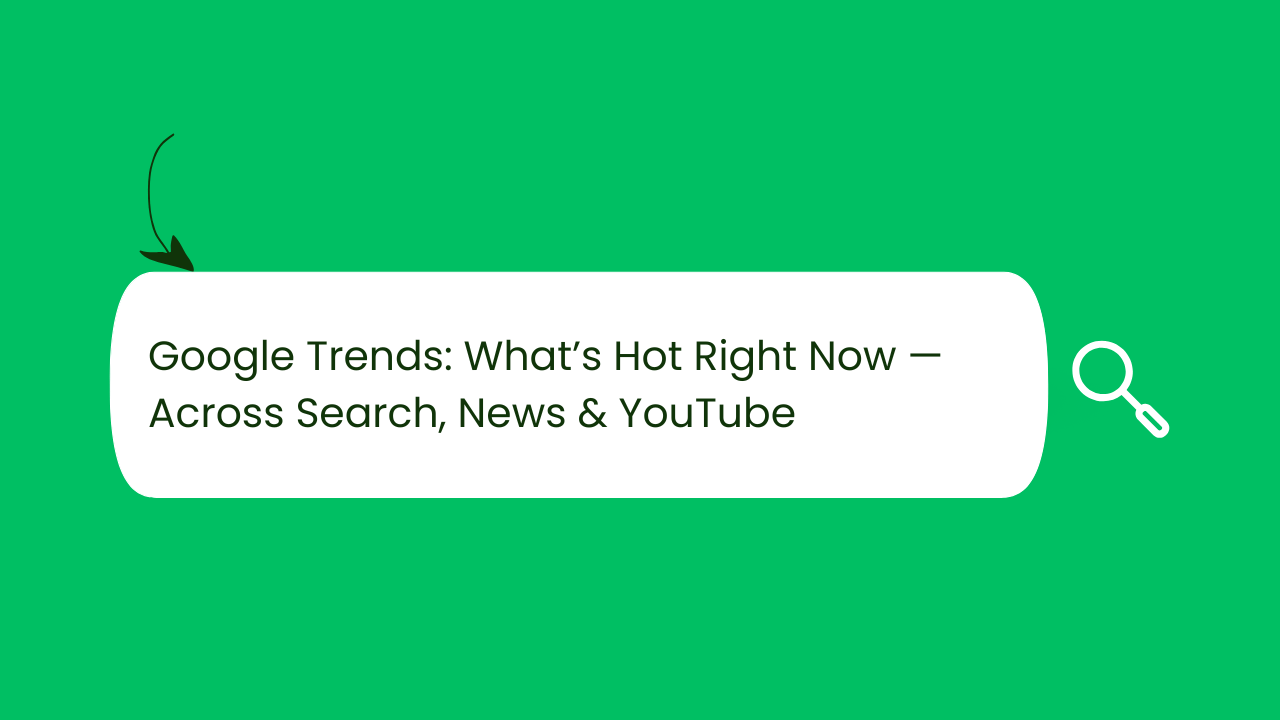Latest Updates
Google Trends: What’s Hot Right Now — Across Search, News & YouTube
Why Google Trends
Why Google Trends Should Be Your Go‑To
If you want to stay ahead in digital, content, or marketing, Google Trends isn’t optional—it’s essential. It shows what people are searching for, reading about, and watching right now. Whether you’re building content, planning campaigns, or tracking audience behavior, Trends gives you real‑time insight.
In this post we’ll cover:
What “see what’s trending” across Google Search, Google News, and YouTube really means
How Trends works behind the scenes
Examples of top Google searches today, with focus on India
What Google Trends India YouTube reveals
Why “trending searches today” matter — and how to use them
Let’s dive in.
1. See What’s Trending Across Google Search, Google News & YouTube
When people ask, “What’s trending?” they often mean:
What keywords are suddenly spiking in Google Search
Which topics media outlets are heavily covering (Google News)
Which video topics, music, or viral clips are rising in YouTube
Google Trends lets you pull all these insights together. So you don’t just see what people are searching, but also what they’re reading and viewing.
Why this matters:
Content creators can spot ideas aligned with real demand
Brands can tap into stories or video formats that have momentum
Consultants can advise clients using data, not just intuition
2. How Trends Works: The Mechanics Behind the Buzz
Understanding Google Trends well helps you use it effectively. Here are the key pieces:
Normalized & Relative Interest
Data is shown on a 0–100 scale, where 100 is peak popularity for a term in your chosen time & region. Lower values mean lesser relative interest.
It’s never absolute search volume — if you see “100” today and “50” yesterday, that doesn’t tell you exact numbers, but relative interest.
Comparison, Filtering & Search Types
You can compare terms (e.g. “crypto news” vs “stock market crash”) to see which one’s rising more.
Filter by region, time range (past hour, day, week, month, year), or category (Health, Sports, Entertainment, etc.).
Also choose search type: Web Search, Image Search, YouTube Search. That’s key for seeing what people want in video form vs reading form.
Rising Queries, Breakout Trends, and Related Searches
Rising queries are terms climbing in interest; breakout are those with huge spikes (often thousands of percent).
Related searches show what people who search for one term also search for — great for discovering subtopics or angles.
What Google News & YouTube Add
Google News helps detect which stories are getting media push & public attention.
YouTube Search behavior adds insight about what people want to watch. If “AI demo videos” are trending on YouTube, maybe your next video should tap into that.
3. Top Google Searches Today: What People Are Curious About
Here’s what “top searches today” tends to look like — globally and especially in India.
India: Consistent & Trending
Everyday searches like weather, WhatsApp Web, YouTube, Flipkart, Sarkari result etc. dominate. These are steady‑state high‑demand search terms.
Sudden spikes happen when there are events: e.g. financial markets (“Bank Nifty”), local festivals, movie releases, cricket match results.
What’s Actually Trending Today (India)
Depending on the day, trending searches may include:
A breaking news event (political, social, or crime)
A viral video or YouTube short
Big sports event or match outcome
Searches for new songs, movies, or TV shows
These trending search queries are visible via the Google Trends dashboard, or via tools/apps that list “today’s trending searches” by region.
4. Google Trends India YouTube: What the Video‑Side Reveals
Because video is huge in India—mobile data, regional content, music, shorts—looking at YouTube search behavior via Trends gives some of the most actionable signals.
How to Access & What to Watch
In Google Trends, select YouTube Search as the filter. You’ll see what video topics people are typing in.
Use regional and language filters. India is very linguistically diverse; trending video searches in Hindi, Tamil, Marathi, etc., can differ widely.
Why it’s Unmissable for Creators & Brands
If you see “Bollywood trailer + review” trending on YouTube Search, maybe release content aligned to that.
If a short or song music video is rising, think of collaborative or reaction content.
“YouTube Trends India” isn’t just what people watch—it’s what they want to search for. That reflects demand you can fill.
5. Trending Searches Today: Snapshots, Use Cases & Recommendations
Here’s how to interpret what’s trending right now, and how to act on it.
What Does a Trending Search Tell You?
It signals current public interest: what people want to know, what’s upsetting or exciting them
It reflects content demand: searches + video + news all feed into what kind of content is being consumed
Sample Snapshots
A sudden spike in “earthquake news India” → maybe a natural disaster or breaking event
Rising search for a new film release + “film review” + “box office collection”
Surge in video searches like “DIY tech gadget review” or “AI art tool tutorial”
What to Do When You Spot a Trend
React fast: produce content while interest is hot
Use related queries to find niche angles (e.g. “how to use AI art tool safely”)
Localize: tailor for your city, language, culture
Cross platforms: If a trend is big in news, match with blog content; if video searches are rising, make video content
Measure decay: sometimes trends are short‑lived. Be wary of investing too much too early
6. SEO & Content Strategy: Keywords & LSI Terms to Use
To make your content get found, here’s how to weave in good keywords and LSI (latent semantic) terms alongside Google Trends.
Focus Keyword: Google Trends
Useful LSI Keywords:
search trends
rising queries
related searches
YouTube search behavior
Examples of using these:
“Check Google Trends to see rising queries in your niche.”
“Use related searches to find untapped content questions people are asking.”
“Analyze both Web Search and YouTube Search behavior to shape multi‑format content.”
By mixing these, search engines understand your content covers both the tool (Google Trends) and all the related ideas users might search for.
7. Short Case: Applying Google Trends (Lifza Tech Perspective)
Here are a few quick example scenarios where you (or your clients) can use Trends insight to advantage.
| Scenario | Insight from Google Trends | Actionable Outcome |
|---|---|---|
| New product launch | Trends shows “AI gadget review India” rising | Create video review + blog post + PR outreach around “AI gadget” theme |
| Social media campaign | YouTube Search behavior shows rising interest in “dance challenge + song name” | Sponsor / create a challenge tied to a trending song |
| Local business expansion | Related searches show “restaurants near me” + “home delivery” rising | SEO optimize local pages & run Google Ads targeting these queries |
| Content calendar planning | Trends shows “movie trailer review”, “film release date” rising weekly | Plan content around film reviews, ticket booking tips, etc. |
8. Why Trending Searches Today Matter More
Trending searches are like signals in the noise. They give you:
Real‑time audience mindset — what’s on people’s minds right now
Competitive advantage — early movers get higher visibility
Content and product relevance — matching what people seek increases engagement
Better ROI on content & campaigns — because you’re not creating blind, you’re responding to demand
9. Limitations & Best Practices
While Google Trends is powerful, it’s not perfect. Knowing what it can’t tell you is as important as what it can.
Limitations
You won’t see absolute numbers: “how many people searched” is rarely shown
Trends might underrepresent smaller geographies or niche topics with low volume
Spikes can be misleading—some are short‑lived or driven by news cycles
Data normalization can make comparisons tricky
Best Practices (so your use of Trends is sharp)
Always filter by region/time relevant to your audience
Combine Trends with other tools (SEO tools, keyword planners, social listening)
Monitor trends over time, not just moment by moment
Prioritize content that matches your domain / niche so you can compete well
Conclusion: Be Trend‑Smart, Be First
In a world where attention shifts faster than ever, Google Trends is your early‑warning system, your idea generator, your content compass.
By understanding how Trends works, keeping a pulse on top searches today, seeing what’s rising on YouTube (especially in India), and acting when a trend spikes, you position yourself or your brand ahead of the curve—not behind it.
If you like, I can format this into a content plan for your clients, or prepare templates you can use to monitor Trends daily. Want me to prep that for you?



